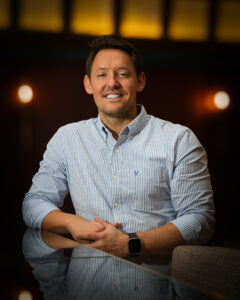Dr Chris Leech explores the development and importance of guided implant workflows for achieving exceptional treatment outcomes ahead of his workshop at the highly-anticipated BACD 20th Annual Conference.
Dental implantology has developed substantially in recent years. Implants are no longer just placed where there is sufficient bone and prosthetics designed around this. Dr Christopher Leech – Principal of Clear Dentistry in Southampton, Fellow of and Examiner for the Royal College of Surgeons Edinburgh – considers the emerging gold standard approach for implant treatment:
“For a good outcome, never mind an excellent aesthetic result, it is paramount for an implant to be placed in a prosthetically-driven position. This means that the restoring dentist determines the most appropriate implant location, with surgical guides and stents created to ensure that the implant is placed exactly as planned. The result is optimised function, aesthetics and longevity of the restoration.
“Technology and techniques available today make the guided implant workflow a reality for every dentist,” Chris says. “CT/CBCT scanners and 3D printers are more widely accessible and make it possible. Where inadequate bone volume is identified at the preferred implant site, regenerative techniques like guided bone regeneration (GBR) can also be implemented to facilitate amazing restorative outcomes.”
For those who are new to the guided implant workflow, Chris is confident that it can cost substantially less than you might think:
“To implement this modern approach to dental implants, you will need the relevant guided kits and compatible equipment. The upfront investment required is hugely variable. If you buy a new CT scanner or 3D printer, for example, that will incur significant costs. Guided implant burr and drill kits cost around £1,500. However, if you’re just starting out in the field, then referring your patients for image acquisition and outsourcing guide manufacture to your lab – fees for both will be covered by your patient – will mean your personal investment is £0. Similarly, many manufacturers will provide the kits for free when you purchase the implants, costing you absolutely nothing upfront to try guided surgery.”
Chris goes on to explain some of the many advantages of guided implant surgery:
“Guided implant surgery minimises the risk of surgical complications like iatrogenic trauma to the patient, which reduces stress for the clinician. It makes surgery faster as you have everything planned. In addition, restoration is simpler because you know exactly what kind of access you’ll have for the prosthetic screw, and will be appropriately prepared. The emergence profile created is also optimised, preventing gingival recession and enhancing aesthetic outcomes. What’s more, the prosthesis is more cleansable for the patient, further improving longevity.
“There are monstrous implications for medicolegal protection when using guided surgery as well. If you hit a nerve having not used a guided approach, there is little defence against a complaint. Guided surgery is becoming increasingly accessible – avoiding it puts you at an unnecessary increased risk.”
Chris will dive into all this and more during his workshop at the upcoming BACD Annual Conference in London this November. Entitled “Guided Implant Placement and Cosmetic Outcomes: The Perfect Pairing”, the session will give delegates an opportunity to learn the guided workflow and then place an implant in a model themselves to really understand the process. Highlighting what he hopes colleagues will gain from attending, Chris says:
“My session will be an introduction to guided implant surgery for beginners, so there are no silly questions. I hope clinicians gain a complete understanding of how they can utilise the workflow to make their lives easier and less stressful, while also improving clinical outcomes. I hope to show how easy it is to access this world, and that you don’t need huge amounts of additional training or money to get started.
“As with any area of dentistry, I would recommend finding a mentor in order to apply these new skills in practice – being at the BACD Annual Conference helps with this too. You will be surrounded by experienced and talented clinicians who you can ask for advice and seek mentorship from. Colleagues are always welcome to shadow me at my clinic and I’m sure many of my BACD peers would feel the same.”
Aside from an extensive network of like-minded professionals who care passionately about clinical excellence and patient care, the BACD Annual Conference affords many further benefits for all who attend. Chris considered why he feels this is such a fantastic event every year:
“The BACD Annual Conference is synonymous with quality and value. The programme delivers the highest quality of education for your CPD, with outstanding speakers from around the world. When you see how much you get when compared to other independent events, you will also discover the enormous value that this Conference offers. This is provided within a highly supportive network of peers – dentistry can feel insular, especially if you are challenging the status quo or looking to bring about positive chance. Being around like-minded people is mentally beneficial and hugely stimulating as you strive to be the very best clinician you can be.”
Don’t miss the BACD Annual Conference this November and help us celebrate 20 years of success. The Gala Dinner is set to be a stunning affair and the perfect complement to the comprehensive educational programme. Book today!
BACD 20th Annual Conference
7-9 November 2024
It’s Our Birthday And We’ll Smile If We Want To!
Pre-sale tickets available at bacd.com














